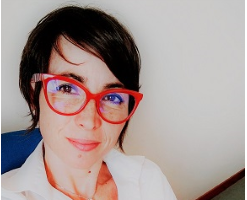A variety of talented researchers and academics contributed to this project.
If you want to have more information about the project, the materials available, possibilities to translate the site and the materials, please contact Caroline Kuhn | c.kuhn@bathspa.ac.uk

Caroline Kuhn H.
Is an experienced open educator and open researcher with a particular interest in critical pedagogy (digital or not) and students’ agency in coded spaces. She has just finished her PhD that explored students’ daily entanglement with digital technologies in HE with a particular interest in open and participatory tools. She works as a senior lecturer at Bath Spa University where she teaches at the School of Education. She is the principal investigator for this project.

Javiera Atenas
Javiera Atenas holds a PhD in education and is a Senior Fellow of the British Higher Education Academy. She is a senior lecturer in learning and teaching enhancement at the Centre for Excellence in Teaching and Learning at the University of Suffolk in the UK. In addition, she is a principal researcher in data and education at ILDA and a member of the UNESCO Dynamic Coalition for Open Education and an advisor in a series of open education and open data projects. Her research focuses on critical areas of academic development, critical data literacy and education policies. Her recent work aims at fostering the development of critical data literacy for the HE sector and the civil society grounded on the concept of ethics as a method and also, in promoting the adoption of elements of data agency, ethics and privacy in open education and digital education policies.
Javiera Atenas | j.atenas@uos.ac.uk

Leo Havemann
Leo is a digital and open education specialist and researcher, a Digital Education Advisor at University College London, and a doctoral researcher at the Open University (UK). He is a member of the Advisory Board of the OK Open Education Working Group, a co-ordinator of the M25 Learning Technology Group (a SIG of the Association for Learning Technology), and is co-founder of the Open Education Policy Lab. He has a wide experience in capacity building in academic practices and in training academics to improve their practice in using pedagogical approaches in educational technology.

Cristian Timmerman
Since November 2020 he is a research associate at the Institute of the History, Philosophy and Ethics of Medicine, Ulm University. Studies in philosophy and political science at the Ludwig-Maximilian University Munich (Magister Artium 2007), PhD at Wageningen University (The Netherlands) with a thesis on “Life Sciences, Intellectual Property Regimes and Global Justice“ (2013). Post-doctoral research fellow at the Jacques Loeb Centre for History and Philosophy of the Life Sciences at the Ben-Gurion University of the Negev in Israel (2013-14), at Institute for Philosophical Research at the Universidad Nacional Autónoma de México (2014-16) and at the Interdisciplinary Center for Studies in Bioethics at the Universidad de Chile (2017-20), with research stays in Manchester, Rom, Salzburg, Brisbane, Louvain-la-Neuve, Hastings Center and the Fondation Brocher. Areas of specialization: medical ethics, research ethics, theories of justice, applied philosophy (agriculture, environment)

Juliana Raffaghelli
A consultant for the design of the learning activities in the context of professional development for HE. Raffaghelli is a Research Professor at the Faculty of Psychology and Education of the Open University of Catalonia. She is a principal researcher on the national project “Professional Learning Ecologies for Digital Scholarship: Modernizing Higher Education by Supporting Professionalism” (National Ministry of Science, Innovation and University of Spain, 2018-2023). Member of the UOC-Edul@b research group. Her research interests are focused on the processes of opening up education and science, in connection to the problem of faculty development for the modernization of higher education. Recently she is analyzing experimental approaches to promote critical data literacy in HEIs.